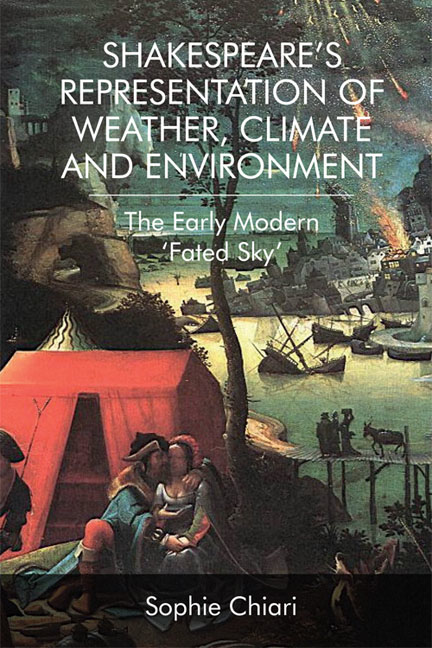Book contents
- Frontmatter
- Contents
- Illustrations
- Acknowledgements
- Textual Note
- Introduction
- 1 ‘We see / The seasons alter’: Climate Change in A Midsummer Night's Dream
- 2 ‘[T]he fire is grown too hot!’: Romeo and Juliet and the Dog Days
- 3 ‘Winter and rough weather’: Arden's Sterile Climate
- 4 Othello: Shakespeare's À bout de souffle
- 5 ‘The pelting of [a] pitiless storm’: Thunder and Lightning in King Lear
- 6 Clime and Slime in Anthony and Cleopatra
- 7 The I/Eye of the Storm: Prospero's Tempest
- Conclusion: ‘Under heaven's eye’
- Bibliography
- Index
Introduction
- Frontmatter
- Contents
- Illustrations
- Acknowledgements
- Textual Note
- Introduction
- 1 ‘We see / The seasons alter’: Climate Change in A Midsummer Night's Dream
- 2 ‘[T]he fire is grown too hot!’: Romeo and Juliet and the Dog Days
- 3 ‘Winter and rough weather’: Arden's Sterile Climate
- 4 Othello: Shakespeare's À bout de souffle
- 5 ‘The pelting of [a] pitiless storm’: Thunder and Lightning in King Lear
- 6 Clime and Slime in Anthony and Cleopatra
- 7 The I/Eye of the Storm: Prospero's Tempest
- Conclusion: ‘Under heaven's eye’
- Bibliography
- Index
Summary
And as it was in the dayes of Noe […]
[…] the flood came, and destroyed them all.
Like wise also, as it was in the dayes of Lot […]
[…] it rained fyre and brimstone from heauen, and destroyed them.
Climate generates fears and superstitions generally assuaged by religious rituals and representations. In England, the Reformation tried to eradicate the beliefs of the old religion but, as far as climate and weather are concerned, no really satisfactory results were achieved. The sky remained ominous and often threatening while astrological attempts to read one's destiny in the stars (well before William Herschel's observations) or in the clouds (when Luke Howard's classification was not even conceivable) long continued to flourish. At any rate, in the Geneva Bible, Shakespeare's contemporaries could find plenty of stories telling of the erratic weather caused by God's wrath and were used to reading the changes in the English firmament in the light of the Scriptures. Most of them still thought that, because of men's ingrained tendency to sin, the rain poured down from the heavens, threatening to engulf the peasants’ yearly harvests, if not humanity at large, and fl ashes of lightning cracked in angry skies, punishing human hubris.
All the same, important as this biblical background may have been, early modern scholars and writers began to question the extent and even the reality of the sky's influence upon their daily lives. While apocalyptic discourses and sermons attributing natural disasters to divine fury weighed heavily upon them, men of letters increasingly challenged such assumptions as they reassessed men and women's abilities to act upon celestial forces rather than being acted upon by them.
Plays of the period illustrate this new trend of thought and Shakespeare's All's Well That Ends Well (c. 1604) is certainly one of them. After engaging in a series of witty exchanges with Paroles, Helen, the daughter of the famous physician Gérard de Narbonne, concludes the opening scene by stating her determination to try and cure the old French king's fistula and by making clear that this is her own free decision rather than luck or fortune coming from above:
Our remedies oft in ourselves do lie
Which we ascribe to heaven. The fated sky
Gives us free scope, only doth backward pull
Our slow designs when we ourselves are dull. (1.1.212–15)
- Type
- Chapter
- Information
- Shakespeare's Representation of Weather, Climate and EnvironmentThe Early Modern ‘Fated Sky’, pp. 1 - 30Publisher: Edinburgh University PressPrint publication year: 2017



